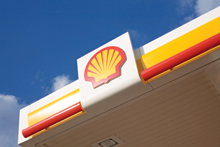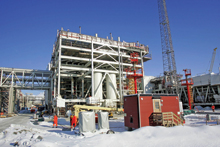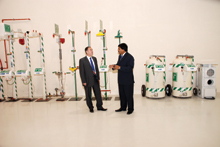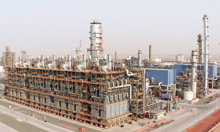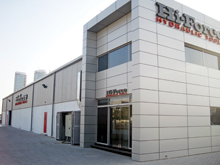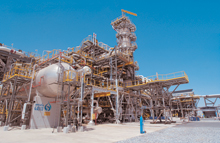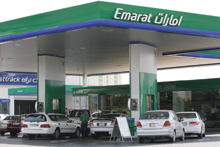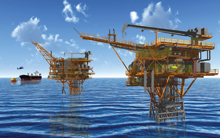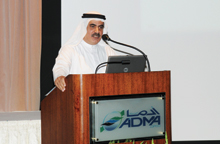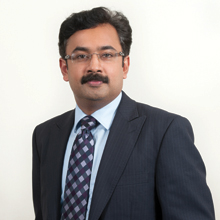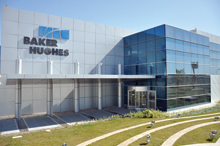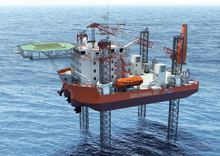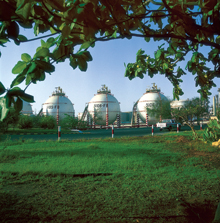
THE UAE’s state-owned Adnoc has raised the plateau output capacity target for the offshore Upper Zakum oil field to 1 mbpd from 750,000 bpd, a senior executive of the Adnoc-led consortium operating the field says.
Adnoc wants production from the UAE’s largest oil field, located in shallow water in the Gulf of the Abu Dhabi emirate, raised to 750,000 bpd by 2017 from the current level of between 585,000 and 590,000 bpd, says Ali Hassan Al Marzooqi, senior vice president at the Zakum Development Company.
Marzooqi says Adnoc would then look to raise output to at least 1 mbpd by 2020, with that level to be sustained for 25 years.
He says that Zadco’s international partners, ExxonMobil and Japan’s Jodco, had committed to investing pro-rata shares of capital costs expected to be $12 billion and $14 million respectively to achieve the original 750,000 bpd output target.
They had not yet agreed to participate in a further $1 billion of investment to bring output capacity to 1 mbpd but, if necessary, Adnoc would provide 100 per cent of the additional financing, Marzooqi says. Adnoc holds a 60 per cent interest in Zadco.
Upper Zakum, which was brought onstream less than a decade ago, has about 50 billion barrels of oil in place, of which roughly 20 billion could be extracted without enhanced oil recovery, Marzooqi says.
With extensive water flooding and possibly miscible gas flooding with carbon dioxide, the recovery factor could be raised to as much as 70 per cent, he says.
A number of international oil majors are also part of a partnership in the Adco onshore oil concession, whose contract is set to expire in January next year.
The current Adco shareholders are Adnoc (60 per cent), BP, ExxonMobil, Shell and Total (9.5 per cent each) and Portugal’s Partex (2 per cent).
All the current international partners except Partex are understood to have been invited to bid for the new contract, along with seven potential new international partners.
Adco CEO Abdul Munim Al Kindy says that Abu Dhabi would not split the concession, which contains its biggest onshore oil fields, into smaller sections after the current contract expires.
“When you’ve built up a company for 50 years and established top tier production, it’s something you would try to maintain,” he says.
Nonetheless, the timing of a new partnership agreement for the Adco concession as well as its future international shareholders remained uncertain, Kindy indicates.
He declines to comment on how many bids had been received for the concession from international oil companies or groups of foreign companies.
Kindy says developments aimed at increasing Adco’s total output to 1.8 mbpd by 2017-2018 from 1.6 mbpd currently were progressing despite the lingering uncertainty over the concession’s future, as Adco was capable of continuing the work without further technical input from its current international partners.
Adnoc would market Adco’s crude, including the Murjan export grade, after the concession’s expiry, he adds.
With the end of the current concession only two months away, Adco on November 6 brought phase one of a new Abu Dhabi onshore oil project, Qusahwira, on stream at 30,000 bpd. Output from the field was scheduled to increase to 53,000 bpd by 2017, Kindy says.
As for Adco’s current international shareholders, Adnoc appreciated their knowledge base and the processes they could bring to Abu Dhabi’s oil and gas sector. In addition, there were strategic reasons for continuing to forge international partnerships, he says.
To help attain a new target set by Abu Dhabi’s Supreme Petroleum Council of ultimately recovering an average 70 per cent or higher of original oil in place from Abu Dhabi’s onshore and offshore fields, the new Adco concession might give bigger leadership roles to certain partners for the development of specific fields, while stopping short of breaking up the concession, Al Kindy elaborates.
The proposed increase in ultimate oil recovery to a level significantly above the current international average was realistic, he says.
Abu Dhabi’s Supreme Petroleum Company, chaired by Abu Dhabi ruler Sheikh Khalifa Bin Zayed, who is also the president of the UAE, is the top decision-making authority for the leading UAE emirate’s oil and gas sector. Its responsibilities include granting concessions and setting production targets, which Adnoc is tasked with implementing.
BP CEO Bob Dudley says the British company had been invited to bid on the new Adco concession and had submitted a bid.
“We are very pleased to have been invited to bid and we feel we have a lot to bring in terms of water flood technology and management of very large fields,” he says. “We’ve presented what we think is a very, very serious bid. We’d like to stay working here as we have for the next 70 years.”
BP has been a partner in Abu Dhabi’s oil sector for nearly 75 years.







































































